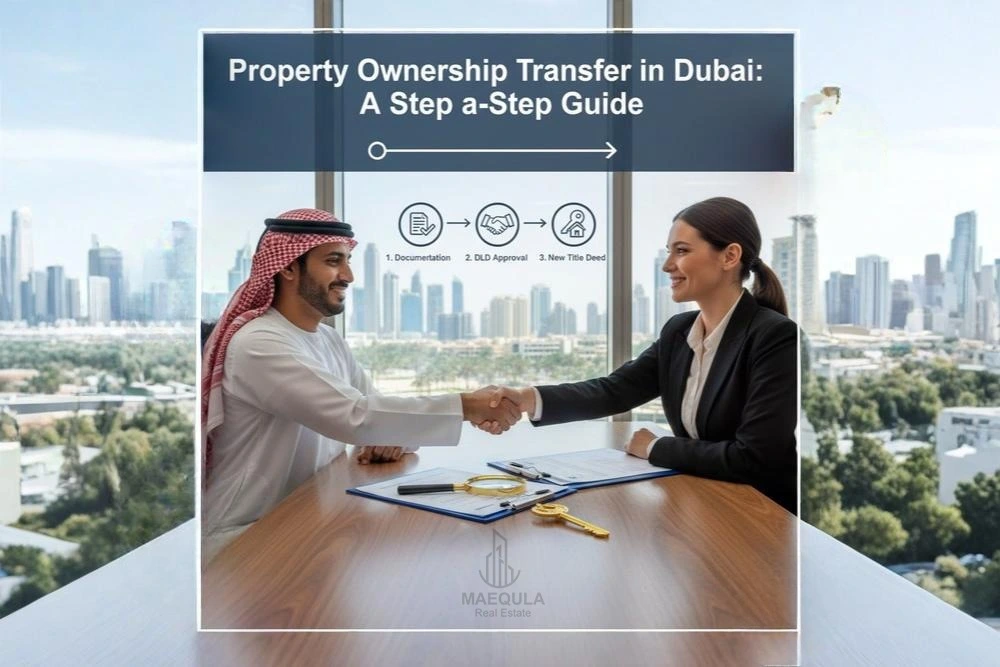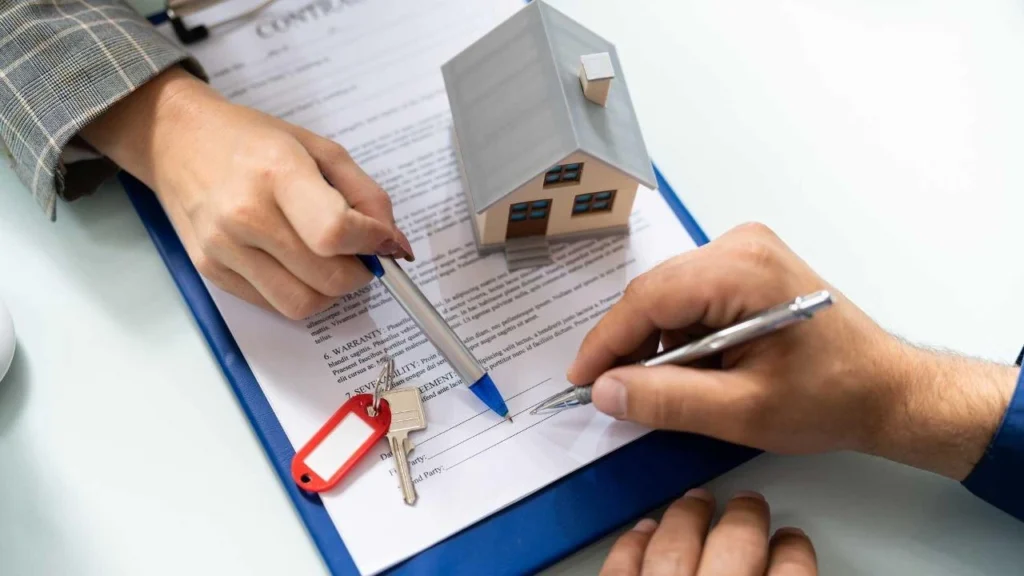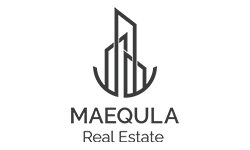
Property Ownership Transfer in Dubai: A Step-by-Step Guide
Buying and selling property in Dubai is more than just a business deal. It is a process that gives buyers legal security and sellers peace of mind. A proper transfer of ownership ensures that both parties are protected under Dubai’s real estate laws.
The Dubai Land Department (DLD) plays a central role in this process. Every transaction goes through the DLD or its trustee offices, which guarantees that the deal is safe and transparent.
In this guide, you will find:
- A simple step-by-step process for property ownership transfer
- The documents required at each stage
- Costs involved such as DLD transfer fees and NOC charges
- Special cases like inheritance or gift transfers
By the end, you will know exactly what to expect when transferring property in Dubai, whether you are buying an apartment in Downtown, selling a villa in Palm Jumeirah or gifting property to a family member.
Understanding Property Ownership Transfer in Dubai
Transferring property ownership in Dubai is more than signing papers. It is a legal process that ensures a property changes hands in a safe and transparent way. The Dubai Land Department (DLD) manages this process and makes sure that both buyers and sellers are protected.
What Does Property Transfer Mean?
Property ownership transfer can happen in different situations:
- Sale of property – the most common form where a buyer purchases from a seller.
- Gift transfer – often between family members, with reduced fees compared to sales.
- Inheritance transfer – when ownership passes to heirs through legal approval.
- Corporate transfer – when a property is held under a company and ownership shifts within the entity.
Each case has specific rules under the DLD, which is why understanding the type of transfer is the first step.
The Legal Framework
Dubai follows a clear property ownership law. The DLD ensures every transaction is recorded in its official system. This reduces disputes and provides security for investors. For expats, freehold areas allow full ownership. In other zones, leasehold rights may apply.
Why the Title Deed Matters
The title deed is the proof of ownership. Without it, no transfer can take place. A valid title deed confirms the property is registered with the DLD and free from legal issues.
Think of it as the passport of the property. It shows who the owner is, where the property is located and its current status. Whether you are selling a Downtown Dubai apartment or gifting a villa in Jumeirah, the title deed is always the foundation of the transfer.

Required Documents for Property Transfer
Transferring property ownership in Dubai is a legal process managed by the Dubai Land Department. To make sure it goes smoothly, buyers and sellers must prepare a set of key documents. These papers confirm identity, ownership rights and financial clearance.
Identity Proof
Every buyer and seller must present valid identification.
- Passport copy
- Emirates ID copy
These confirm that the parties are eligible to complete the transaction.
Title Deed
The original title deed shows legal ownership of the property. It must be presented at the Dubai Land Department to transfer rights to the new owner.
No Objection Certificate (NOC)
An NOC from the developer ensures there are no unpaid service charges or disputes. Developers also confirm that the property is free of violations.
- Example: A villa owner in Palm Jumeirah must obtain an NOC from Nakheel before completing the transfer.
Sale and Purchase Agreement (SPA)
This agreement records the price, terms and conditions agreed by both parties. It acts as the legal foundation of the transfer.
Mortgage Clearance Letter
If the property is under mortgage, a clearance letter from the bank is required. This confirms that the outstanding loan has been settled or will be transferred to the new buyer.
Step-by-Step Process of Property Transfer in Dubai
Transferring property ownership in Dubai follows a clear path set by the Dubai Land Department (DLD). Each stage matters because it ensures that the transaction is legal and secure.
Step 1: Agreement Between Buyer and Seller
- The first move is simple. Buyer and seller agree on the property sale and draft a sale and purchase agreement.
- This document highlights the price, payment plan and any special terms.
It acts as the foundation of the deal and protects both parties.
Step 2: Obtain NOC from Developer
- No transaction moves ahead without a No Objection Certificate (NOC) from the developer.
- The NOC proves that there are no pending service charges or disputes linked to the property.
For example, if the unit is in Downtown Dubai, the developer Emaar will issue the NOC once all dues are cleared.
Step 3: Visit Dubai Land Department Trustee Office
- Once the NOC is ready, both parties visit an official DLD trustee office.
- Here documents such as the title deed, Emirates ID and passport copies are submitted.
The trustee verifies everything, ensuring the deal complies with Dubai property laws.
Step 4: Payment and Transfer Fees
- After verification comes the financial step.
- The buyer pays the property value along with DLD transfer fees which are usually 4% of the property price.
- There is also an admin fee for issuing the new title deed.
If a mortgage is involved, additional mortgage registration fees apply.
Step 5: Issuance of New Title Deed
- Once all payments are cleared, the DLD issues a fresh title deed under the buyer’s name.
- This marks the official transfer of ownership.
- For the buyer, this is the most rewarding stage as they become the new legal owner of the property.

Costs Involved in Property Ownership Transfer
When transferring property in Dubai you need to budget for several fees. These charges are set by the Dubai Land Department (DLD) and the property developer. Knowing the breakdown makes the process easier to plan.
DLD Transfer Fee
The Dubai Land Department charges 4% of the property value as a transfer fee. This is often shared between buyer and seller though the final decision depends on the agreement.
Trustee Office Fee
The trustee office manages the transfer and issues the new title deed. The fee usually ranges from 2,000 AED to 4,000 AED.
NOC Charges
A No Objection Certificate (NOC) from the developer is required before the transfer. The cost varies between 500 AED and 5,000 AED depending on the community and the developer.
Mortgage Registration Fee
If the property is under mortgage an extra fee applies. The DLD charges 0.25% of the loan amount plus 290 AED as an admin fee. This step ensures the mortgage is recorded under the new owner.
Pro Tip: Always confirm these fees with the DLD trustee office and the developer in advance. It prevents delays and avoids hidden surprises.
Special Cases of Property Transfer
Not every property transfer in Dubai follows the standard sale and purchase route. Some cases require extra steps, special documents or lower fees. Understanding these scenarios helps investors and families avoid delays.
Inheritance Transfers
When property passes on after the death of the owner, the transfer process falls under UAE inheritance laws. Court approval is needed before the title deed can be updated. The Dubai Land Department will only complete the transfer once the legal heirs are confirmed by the court. Families usually need:
- Death certificate of the property owner
- Succession certificate from the court
- Original title deed of the property
This ensures the property is handed to the rightful heirs without disputes.
Gift Transfers
Some owners choose to transfer property as a gift to close family members. The DLD applies a reduced transfer fee in such cases. Instead of the standard 4% fee, the rate is only 0.125% of the property value (AED). Documents needed usually include:
- Proof of family relationship
- Gift deed signed by both parties
- Valid title deed
Gift transfers are common for parents passing villas or apartments to children.
Corporate Ownership Transfers
If a company owns property in Dubai and wishes to transfer ownership, additional steps apply. The process requires valid company documents that prove the legal right to buy or sell. These usually include:
- Trade license copy
- Memorandum of Association
- Board resolution authorizing the transfer
Such transfers are common for real estate investment firms or holding companies. The DLD ensures the transaction aligns with corporate laws in the UAE.
Pro Tip: Whether it is inheritance, gift or corporate ownership, always check with the Dubai Land Department or a trustee office before starting. Each case may have unique rules depending on the property type and location.
Common Challenges and How to Avoid Them
The property transfer process in Dubai is clear and secure. Still, many buyers and sellers face avoidable hurdles. Being aware of these issues can save time and money.
Delays in Getting the NOC
A No Objection Certificate (NOC) is mandatory for every property transfer. Developers sometimes delay the process if there are pending service charges or unresolved disputes.
- Always clear service fees before applying.
- Request the NOC early in the process so it does not hold up the transfer.
Outstanding Mortgage or Service Fees
If a property has a mortgage, the seller must either clear it or arrange a transfer with the buyer’s bank. Service charges linked to the property can also cause delays.
- Obtain a clearance letter from the bank if there is a mortgage.
- Ensure all service fees are settled with the developer before visiting the trustee office.
Misunderstanding of Cost-Sharing
The Dubai Land Department sets fixed transfer fees. In most cases, buyers and sellers share these costs. However, agreements can differ, which sometimes leads to disputes.
- Clarify in writing how costs will be divided before signing the sales agreement.
- Use the DLD trustee office to guide both parties on official fees.
Pro Tip: Always verify the property status on the Dubai Land Department’s official platform. This confirms if there are mortgages, disputes or outstanding payments linked to the property.
Why Dubai Remains Attractive for Property Ownership
Dubai has become one of the most popular real estate markets in the world. Investors and homeowners are drawn to the city not just for its modern skyline but also for the benefits that come with owning property here.
Freehold Ownership for Expats
One of the biggest attractions is the option for expats to own property in freehold areas. This means the buyer gets full ownership of the property and the land it is built on. Communities like Downtown Dubai, Dubai Marina and Palm Jumeirah are prime freehold zones that continue to attract global investors.
High Rental Yields
Dubai real estate offers strong rental returns compared to many other international markets. Apartments and villas in prime locations can deliver yields between 5% and 8% annually. Short-term rentals for tourists often push returns even higher. For many investors this creates a steady stream of passive income while the property value grows.
Strong Legal Framework
The Dubai Land Department (DLD) and the Real Estate Regulatory Authority (RERA) ensure every transaction is transparent and secure. Buyers are protected through strict laws that prevent fraud and guarantee the transfer of property rights. This legal system builds trust for both local and international investors.
Key Takeaways
- Expats can buy freehold properties in top communities.
- Rental yields are among the highest in the region.
- Laws and regulations protect both buyers and sellers.
Owning property in Dubai is more than just a financial investment. It provides lifestyle benefits, long-term security and access to a market that keeps growing year after year.
Trust the Process, Secure Your Future
Dubai has built a reputation as one of the most reliable real estate markets in the world. The Dubai Land Department (DLD) ensures that every ownership transfer follows a transparent and legally sound process. Investors gain peace of mind knowing that their property rights are protected under a strong regulatory framework.
For both seasoned investors and first-time buyers, this creates confidence to grow wealth in one of the fastest-developing cities globally. The process is clear, fees are standardized and the outcome is a legally registered title deed that secures your ownership for the long term.
At MAEQULA Real Estate, we believe property investment should be simple and stress-free. Our team guides you through every step of the transfer, from documentation to final registration, so you avoid delays and costly mistakes.
If you are planning to buy or sell property in Dubai, reach out to us today. Let us help you make your ownership transfer smooth, secure and completely hassle-free.
FAQs on Property Ownership Transfer in Dubai
1. How long does it take to transfer property ownership in Dubai?
The process usually takes 2 to 3 weeks if all documents are complete and cleared.
2. What are the fees for property ownership transfer in Dubai?
The Dubai Land Department charges a 4% transfer fee plus trustee office fees and NOC charges from the developer.
3. Can expats transfer property ownership in Dubai?
Yes. Expats can buy, sell and transfer property in designated freehold areas approved by the DLD.
4. Do I need to be physically present to transfer property in Dubai?
Yes. Both buyer and seller must attend the transfer. A Power of Attorney can be used if one party cannot be present.
5. What is the role of a DLD trustee office?
A trustee office oversees the transfer, verifies documents and issues the new title deed to the buyer.
6. Are there lower fees for family property transfers in Dubai?
Yes. Gift transfers between family members have reduced DLD fees compared to standard sales.
7. What happens if there is an existing mortgage on the property?
The mortgage must be fully cleared or transferred to the new buyer before the ownership transfer is completed.

Leave a Reply